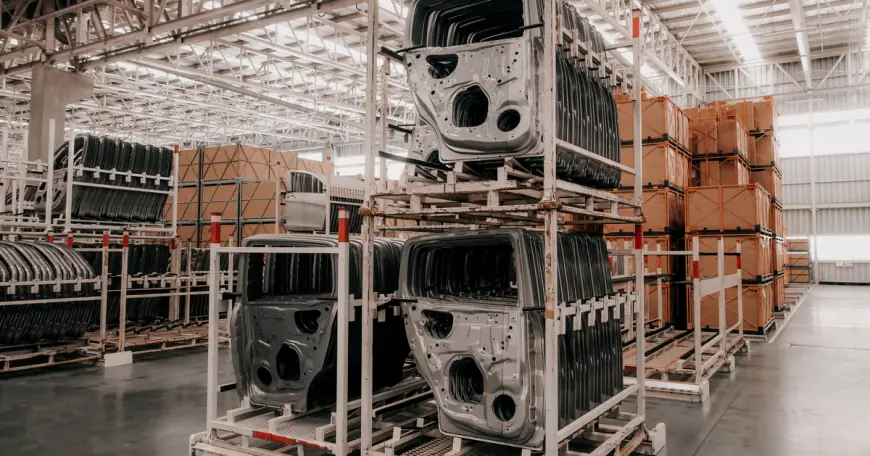GCC Automotive Logistics Market 2030 Competitive Study
Saudi Arabia’s Vision 2030 drives the country’s goal to produce 300,000 vehicles annually by 2030, with strong support for domestic electric vehicle makers like Ceer Motors.

The automotive landscape in the Gulf Cooperation Council (GCC) region is experiencing a major transformation. As vehicle demand escalates across Saudi Arabia, UAE, Qatar, Kuwait, Bahrain, and Oman, the automotive logistics market is rising in importance. According to TechSci Research, the GCC Automotive Logistics Market was valued at USD 6.4 billion in 2024 and is expected to reach USD 8.2 billion by 2030, growing at a CAGR of 4.9% during the forecast period.
This market expansion reflects a growing need for faster, smarter, and more efficient logistics operations to support rising automotive production and aftermarket activities. With logistics serving as the backbone of the automotive supply chain—from the movement of vehicles to the delivery of spare parts—the region is gearing up to become a central hub for automotive logistics innovation.
Industry Key Highlights
- Current Market Size (2024): USD 6.4 Billion
- Projected Market Size (2030): USD 8.2 Billion
- CAGR (2024–2030): 4.9%
- Key Growth Countries: Saudi Arabia, UAE, Qatar
- Top Segment: Transportation Services
- Dominant Market Type: Finished Vehicles and Auto Components
- Key Drivers: Digitization, E-commerce, Smart Supply Chain, Vision 2030 Investments
- Major Players: CEVA Logistics, DHL, DSV, GEODIS, Kuehne + Nagel, and others
Download Free Sample Report: https://www.techsciresearch.com/sample-report.aspx?cid=27893
Market Overview: Logistics as the Lifeblood of the Automotive Sector
In the GCC, automotive logistics serves not only as a facilitator of trade but as a catalyst for economic modernization. The sector involves the movement, storage, and coordination of automotive parts, components, and complete vehicles across the region and international borders.
Amid the region's continued industrial diversification and strategic infrastructure investments under national programs like Saudi Vision 2030, logistics has transitioned from a support function to a strategic enabler. Automotive OEMs, suppliers, and logistics providers are collaborating to streamline supply chains, integrate digital solutions, and implement green logistics practices.
Emerging Trends Shaping the GCC Automotive Logistics Market
1. Rise of Smart and Digital Logistics
IoT, AI, and big data analytics are revolutionizing supply chain operations across the GCC. Real-time tracking, route optimization, warehouse automation, and predictive analytics are enabling companies to make data-driven decisions and optimize operations.
2. E-commerce-Driven Logistics Expansion
The boom in online vehicle sales and aftermarket services is reshaping logistics. Direct-to-consumer delivery of automotive parts is accelerating demand for specialized last-mile logistics services.
3. Sustainable and Green Logistics
With global and regional commitments to reduce carbon emissions, logistics providers are adopting electric delivery fleets, carbon-neutral warehouses, and fuel-efficient transportation methods. The adoption of smart fleet management software is also contributing to sustainable operations.
4. Customized Logistics for Lightweight Vehicles
The shift towards fuel-efficient, electric, and hybrid vehicles necessitates logistics solutions capable of handling composite materials, sensitive electronics, and varied vehicle configurations.
5. Public-Private Partnerships and Mega Infrastructure Projects
Collaborations between governments and logistics providers are driving infrastructure upgrades—such as new ports, highways, and rail networks—that will enhance interconnectivity and reduce transit times.
Market Drivers Fueling the Growth
1. Expanding Automotive Production
Manufacturing hubs are growing across Saudi Arabia and the UAE, supported by favorable government policies and foreign investments. Logistics networks must now accommodate the increased movement of raw materials, components, and finished vehicles.
2. Strategic Location of GCC Countries
The GCC is geographically positioned at the crossroads of Asia, Europe, and Africa. This makes it an ideal logistics corridor for global automotive manufacturers targeting emerging markets.
3. Digitization of Supply Chains
Technology adoption is empowering logistics providers to offer end-to-end visibility, real-time tracking, and intelligent warehousing—crucial for high-value automotive goods.
4. Growth in Automotive Aftermarket
With millions of vehicles in operation, the demand for spare parts and maintenance services is surging. Automotive logistics services are playing a vital role in ensuring timely delivery of aftermarket components.
5. Vision 2030 and Economic Diversification
National strategies such as Saudi Vision 2030 are pushing for industrial diversification, creating strong incentives for investment in logistics infrastructure and innovation.
Segmentation Deep Dive
By Service: Transportation Takes the Lead
The transportation services segment is projected to grow the fastest through 2030. This growth is fueled by the rapid expansion of the automotive sector and increased demand for faster, safer, and more reliable movement of goods. Technological advances like AI-powered route planning and autonomous vehicles are further boosting efficiency.
By Type: Finished Vehicle and Component Logistics
Logistics for finished vehicles continues to dominate, but auto component logistics is gaining momentum, especially with the increase in electric and hybrid vehicle production, which require specialized components and delivery systems.
By Country: Saudi Arabia Leading the Way
Saudi Arabia stands out due to its extensive industrial development, growing consumer base, and substantial investment in logistics corridors and free zones. With increased vehicle production and trade flows, the country is becoming a logistics epicenter in the GCC.
Competitive Landscape: Leading the Logistics Revolution
Major players are competing on service reliability, technological adoption, geographic reach, and cost-effectiveness. Strategic alliances, acquisitions, and innovations are shaping the competitive dynamics.
Top Companies in GCC Automotive Logistics Market
- CEVA Logistics AG – Offers integrated logistics solutions with a growing presence in the Middle East.
- DHL International GmbH – A leader in digital supply chain solutions and express delivery.
- DSV Panalpina A/S – Known for freight forwarding and automotive-specific logistics services.
- KUEHNE + NAGEL – Offers tailored services for vehicle manufacturers and suppliers.
- GEODIS S.A. – Strong in multimodal logistics and warehousing operations.
- Ryder System Inc. – Focuses on fleet management and transportation solutions.
- Nippon Express Co. Ltd – Brings advanced Japanese logistics technology to the GCC.
- United Parcel Service Inc. – Leverages its global network for efficient vehicle part distribution.
- Yusen Logistics Co., Ltd. – Provides value-added automotive logistics services, especially in component handling.
- Deutsche Bahn AG (DB Schenker) – Strong capabilities in freight transport and warehousing across the GCC.
These companies are investing heavily in automated warehousing, AI-based route optimization, and green logistics practices to gain a competitive edge.
Future Outlook: The Road Ahead to 2030
The GCC automotive logistics market is poised for sustained growth, driven by:
- Increased domestic vehicle manufacturing
- Export potential to Africa and Asia
- Smart city projects integrating advanced transport systems
- Continued investment in digital infrastructure
- Growth of electric vehicle (EV) ecosystem requiring specialized logistics
Saudi Arabia, in particular, is expected to remain the frontrunner due to its proactive industrial policies and commitment to becoming a manufacturing and logistics powerhouse. Logistics providers will need to keep pace by innovating, expanding services, and aligning with regulatory standards.
The transition to digital-first and sustainable logistics will shape the next chapter of the GCC automotive logistics narrative, making it one of the most exciting markets in the region's broader transportation sector.
10 Benefits of the TechSci Research Report
Here’s how the TechSci Research report empowers stakeholders:
- In-depth market sizing and growth projections up to 2030
- Detailed segmentation by service, type, and country
- Analysis of emerging technological trends and their impact
- Identification of key drivers, restraints, and opportunities
- Competitive benchmarking of major market players
- Strategic recommendations for logistics providers and OEMs
- Coverage of government regulations and their influence
- Insights into post-pandemic logistics transformation
- Forecasts tailored for investment planning and risk mitigation
- Customizable data sets for specific business needs
This report serves as a critical tool for logistics companies, investors, automakers, and government agencies seeking to understand and capitalize on the region's rapid logistics evolution.
Conclusion
The GCC Automotive Logistics Market is on the cusp of a transformative journey—driven by technology, infrastructure development, and growing vehicle demand. As countries in the region implement strategic reforms and embrace smart logistics systems, the future of automotive logistics looks promising.
Companies that focus on digital innovation, sustainability, and operational efficiency will not only capture market share but also redefine logistics standards in the automotive sector. With continued investment and policy support, the GCC region is set to emerge as a global leader in automotive logistics by 2030.
Contact Us-
Mr. Ken Mathews
708 Third Avenue,
Manhattan, NY,
New York – 10017
Tel: +1-646-360-1656
Email: [email protected]
Website: www.techsciresearch.com
What's Your Reaction?
 Like
0
Like
0
 Dislike
0
Dislike
0
 Love
0
Love
0
 Funny
0
Funny
0
 Angry
0
Angry
0
 Sad
0
Sad
0
 Wow
0
Wow
0


















































